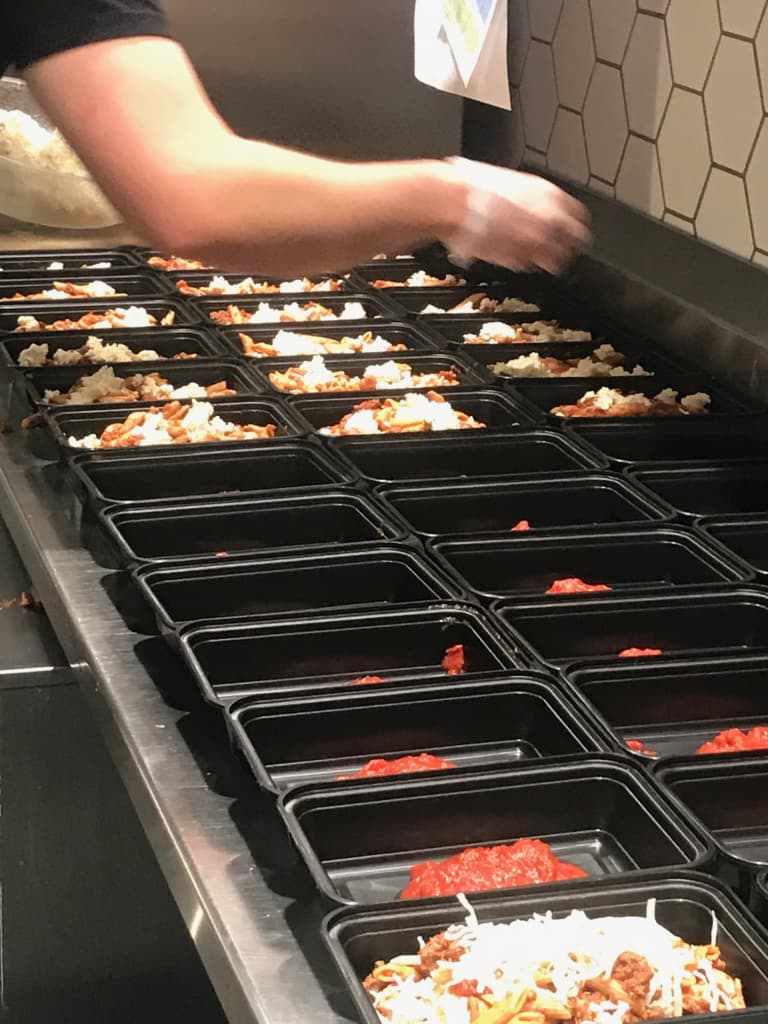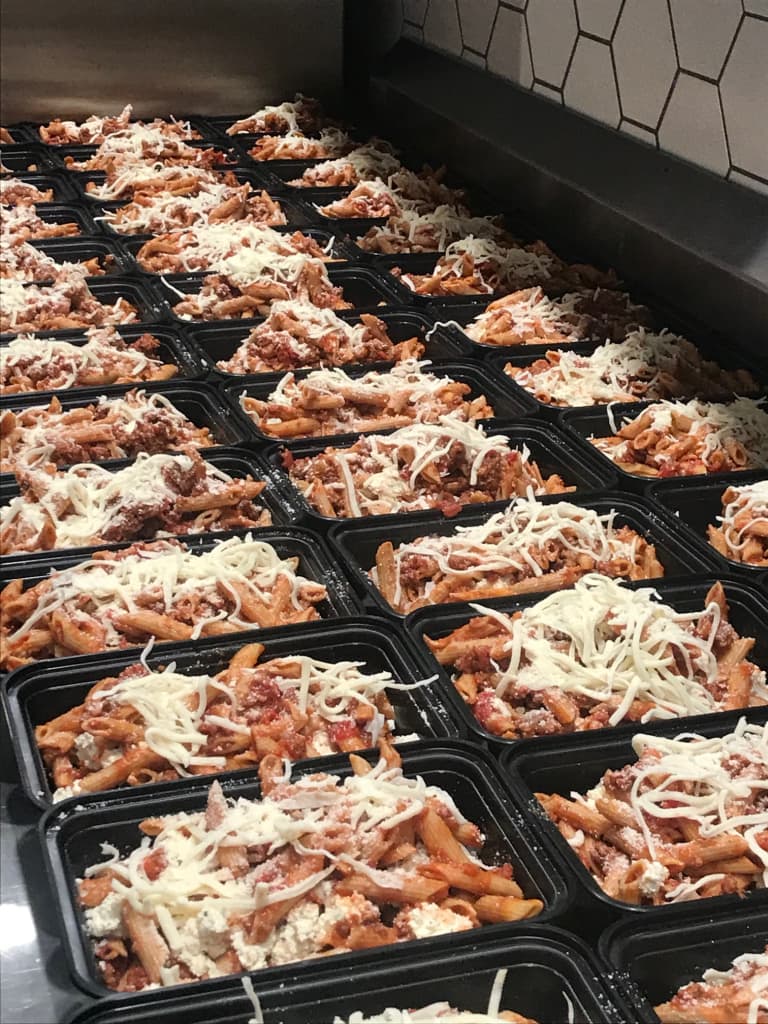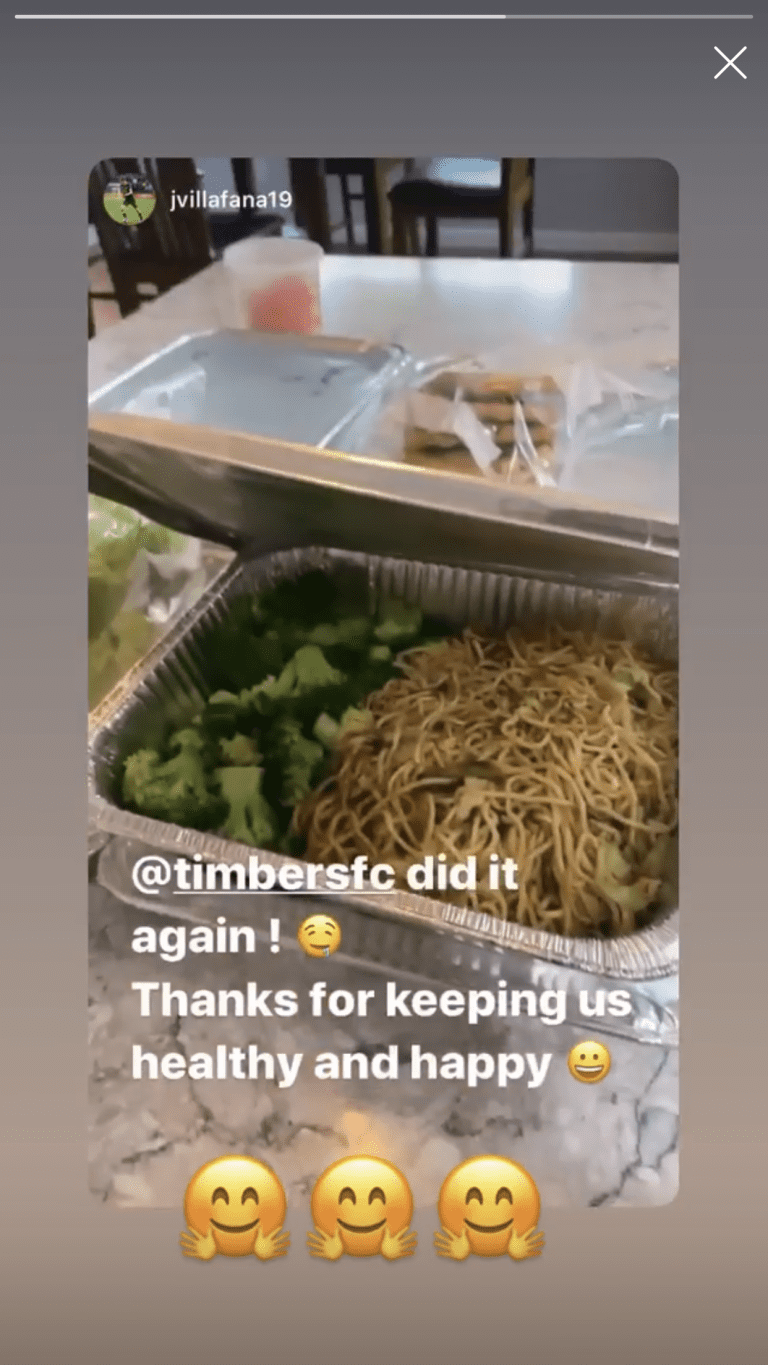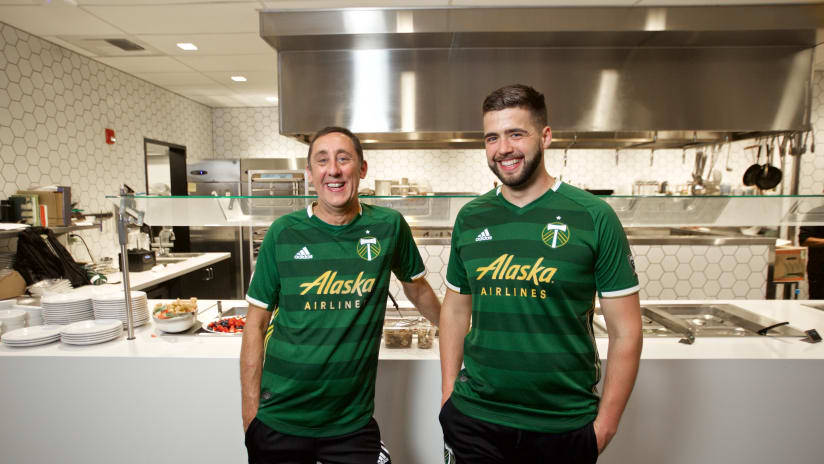“Today, I was in the facility putting together a new idea we have for the second team players.” This is how much Rich Meyer’s life has changed over the last three and a half weeks.
It’s Tuesday when we touch base. Normally, that would mean arriving at the Timbers’ Beaverton Training Center early, putting out food for breakfast while preparing for his work day’s main event: a lunch players from the first team (Major League Soccer’s Portland Timbers), the second team (the United Soccer League’s Timbers 2), as well as the teams’ coaches and support staff. Come afternoon, Meyer and the team’s nutritionist, Anthony DiCicco, will be cleaning the center’s kitchen and preparing for the next day’s routine. Add in sourcing ingredients, managing purchasing, and the overall running of a kitchen, and you’ve got some idea of what Rich Meyer, Portland Timbers team chef, does from moment to moment.
Like the rest of us, Meyer’s seen his life change. The precautions the world has taken for the COVID-19 virus has demanded as much. Instead of a bustling Training Center which, daily, serves MLS, USL and U.S. Soccer Development Academy teams, Meyer and DiCicco find themselves in isolation. By and large, nobody else is allowed in the building. MLS mandated the center is closed for training purposes, with only medically needed evaluations or rehab permitted. It’s gone from bustling to ghost town.
“Even when I’m driving to the facility – Tony and I do a lot of our work on the weekends – the roads are empty,” he marvels. Meyer’s commute from northeast Portland creates a cross section of his hometown. “There’s very little traffic. That’s strange, riding to work like that.”
Alone in the Training Center, Meyer worked on his idea – an extension of how his life has changed because of COVID-19. Instead of his hours being spread across five or six, sometimes seven days of a soccer club’s week, his efforts are now concentrated into four. His days can be slightly longer, now, filled with tasks that don’t make sense when the team is fully training, but there’s now time for the care packages he’s assembling for T2 players. If they have to stay home like the rest of us, then they might as well pick up some life skills.
“The new idea we have for [Timbers 2] is, we will gift them a bag of food,” he explains. “Everyone gets the identical bag of ingredients, and they have to produce an entree using those ingredients. They’ll be judged by who produces the best one.”
Meyer gets his own joke. The typical Timbers 2 player is young – the type you’d imagine enjoying the first freedoms of a post-college world. Undoubtedly, there are exceptions, but the demographic lends itself to an oft-true stereotype: cupboards stocked with cereal and soup; lunch meat-filled crispers below containers of to-go food; frozen staples set to compliment a night’s Call of Duty grind. Recipes are not a topic of conversation around the T2 locker room.
Into this environment, Meyer amplified his joke.
“Honestly, it should be interesting, because they’re actually cooking a piece of fish,” he says. “It is not an easy task. Sink or swim.”
The T2 project is the second phase of Meyer’s new professional life. Phase one is what occupies the other three days of his work week, one which begins each Saturday, involves only one day of cooking, and is centered on how his job can transcend the team’s meal room. Instead of impacting only one building in Beaverton, Meyer’s and DiCicco’s work now gets spread throughout Portland.
“Anthony and I are not setting out daily meals, but in one day we are producing four diffferent meals for let’s say 100 different people.” That’s Meyer’s new Saturday. Every first-team player. The coaches. Some team staff. Even some of the club’s alumni, as well the families for each group. Once a week, Meyer and DiCicco meet in Beaverton and prepare four nights’ worth of meals for each person.
“Rich and Anthony had both been doing a fantastic job at the training facility in cooking and preparing meals for the Timbers and T2 in the preseason,” the Timbers and Thorns president of soccer, Gavin Wilkinson, explains. “With the new shelter-in-place protocols, they’ve pivoted to provide select meals, menus and activities for the Timbers and T2.”
And as those protocols have endured, another team has been added to Meyer’s and DiCicco’s charge.
“Now there’s an expanded opportunity for how Rich and Tony are able to help prepare and deliver select meals and menu plans for the Thorns as well,” according to Wilkinson. Whereas the club’s NWSL team is usually stationed in Goose Hollow, beyond the chefs’ typical reach, the duo’s new delivery service allows them to extend services past their training ground.
If it were the Timbers alone, Meyer and DiCicco would be responsible for producing an estimated 400 meals each week. Now, with the time devoted to the Thorns and T2, the chefs’ uptick in work is undeniable.
“The chefs have basically tripled their output and provided additional nutritional benefits for an even wider swath of the club,” Wilkinson says, “all on top of helping deliver to front office staff in need as well as some of our NASL alumni in the area, too.”
“Instead of going through the motions of just putting out a lunch every day with a couple of options, this is quite a bit different,” Meyer admits, “especially when it comes down to the organization and the packaging. Some players don’t eat [certain things]. We have to accommodate. There are special things for other players that we need to take into account.”
Once that’s done, the meals need to be packaged. That’s Sunday. The entire Sunday, and depending on how things go, part of the next day, too. By midday on Monday, 400 meals need to be ready for delivery drivers to distribute throughout the city. Meyer and DiCicco help with that, too.
“It’s different,” he concedes about his new routine. “You have to be ultra careful about how you prepare everything, how you cool everything, how you store everything, and then how you repackage everything. And then how you deliver. That’s why we have five people delivering: so we can get everything out as quickly as possible. That way it can be back into people’s houses and refrigerators as fast as possible.
“There are limitations to what you can do,” Meyer concedes. “That’s a large difference between what I was doing on a daily basis. And then also, timeframe.” Under normal conditions, the day’s meal needs to be ready when the Timbers are done. Training usually starts at 10:00 a.m. Food has to be out before noon.
“There really isn't a timeframe now,” he says, “because time doesn’t really matter. We just need to be done by 1 p.m. on Monday [for delivery]. We don’t have to be done by a specific time for players. Anthony and I can set our own hours, as we want.”




It’s a small aspect of the surreal. What was once highly regimented and beyond his control now has more freedoms, albeit with a cost. The music he’d play aloud in the mornings, when the kitchen and the facility were his own, can now be played more often, and at all hours. It’s only him and Anthony, now. There aren’t 70, 80 other people in the building to take into account.
But there also aren’t 70 or 80 other people to take into account. There’s almost nobody at the Training Center, beyond Meyer and DiCicco. The other people that are at the facility, like the grounds crew maintaining the center’s field, stay at a distance. In the current state, Meyer feels responsible for everything that comes through the center’s doors.
“When you work in a kitchen as a chef, you’re already ultra careful about how you handle food,” he explains. “Now, with this other aspect of everything going on, we have to be ultra, ultra careful, even with how we receive things at the facility.
“The food is being delivered to me, and I have it delivered outside the garage door. And I bring it in. That way we won’t have anybody else come into the facility. We’re being that careful. We’re just taking extra precautions with everything.”
- PTFC Cafe: Sebastián Blanco's skillet steak and potatoes
- PTFC Cafe:Morgan Weaver's banana bread from mom
- PTFC Cafe: Bella Bixby's "Chicken" satay with peanut sauce
It’s a level of precaution that could persist beyond now. Some new habits are going to take hold. But eventually, the four-day work weeks will stop. The traffic that backs up on the southbound 217 will return. Players and coaches will be back in the meal room, and the time Meyer gets at home with his wife, a teacher working out of their house, and his 15- and 12-year-old kids will go back to normal. Most of the surreal will be gone.
Until then, Meyer is thankful for the work he has. He makes sure to say so. “I’m very pleased about that,” he says at the beginning of our call, when asked about his new delivery service. He’s thankful for his current normal.
“In all honesty, it is,” he admits, when asked about his kitchen escape. “It is nice to be out, to be with Anthony, and to chat back and forth. It is absolutely nice. No complaints.”












